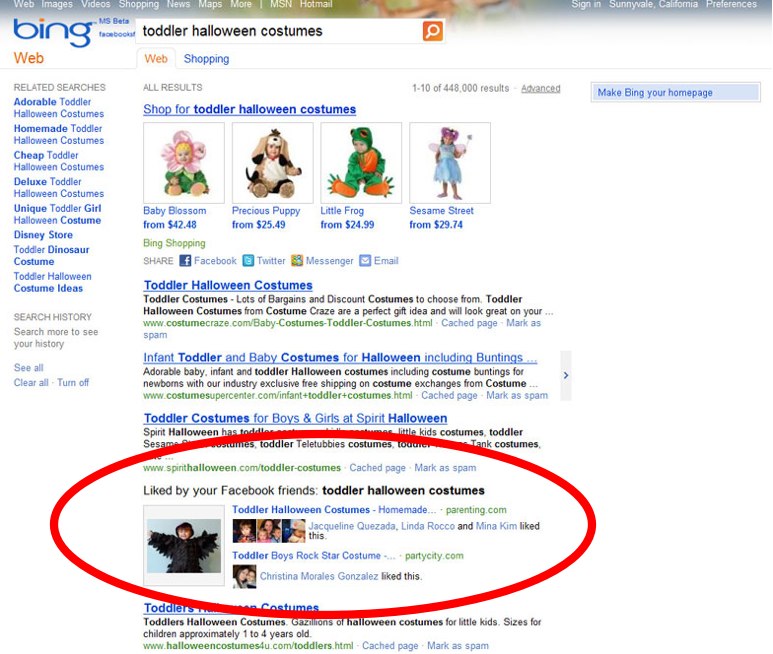Facebook partners with "underdog" Microsoft to make Bing more social

Microsoft and Facebook are teaming up to bring a new feel to search results on Bing. At an event on Microsoft's Silicon Valley campus today, the companies announced a partnership that will enhance the results of what you're looking for by adding a Facebook module into the search results. (Facebook blog, Bing blog, Techmeme)
But it's more than just that. Those results are personalized, exclusive to you - based on what your friends on Facebook are saying or, more importantly, "liking" about the topics you're searching about.
Here are the examples that drive it home. Let's say you're doing some research about a particular type of car. Type in that search and you'll see the articles that your friends have "liked" on Facebook.
Better yet, take the example of people search. Let's say you're looking for a former classmate who shares a name with a business executive or celebrity. That person is likely to dominate the results. But now, a thumbnail of that classmate - easily found because you have mutual friends - appears as a thumbnail icon, along with links to add as a friend or send a message.
From the stage, Qi Lu, president of the Microsoft's Bing division, explained, "We take a broad holistic view of search. To us, search at its very core, is about understanding user intent" and to bring information and knowledge based on that. Today's form he said is a query box that reads keywords and delivers a list of results. But as the web evolves, that isn't necessarily the best experience.
The push into social search is big for Microsoft's Bing, which has been working to gain some search share from search powerhouse Google. But why would Facebook partner with Microsoft, instead of Bing?
Facebook CEO Mark Zuckerberg, who was also in attendance, offered some insight. Facebook may have started off as a social site, he said, but it has really become more of a platform. That social platform has opened doors for third-party sites to tap into the Facebook ecosystem, now more than 500 million users strong.
Games are the best example. Facebook wasn't interested in creating social games but small "scrappy underdogs" like Zynga, the maker of Farmville, were. Those sorts of companies, by integrating the social element into the game, have seen huge growth - faster and stronger than some long-established companies.
Again, why Microsoft? Zuckerberg explains:
They really are the underdog here. They're incentivized to go out and innovate. When you're an incumbent in an area... there's tension between innovating and trying new things versus what you already have.
It's hard to think of Microsoft as an underdog. But when it comes to search, Microsoft really is the small guy here. Dare I say it's almost like a startup?
Increasingly, social is important. And yes, we are tapping into our network of Facebook friends more often for recommendations and advice. Integrating that experience beyond Facebook's walled garden is a good thing.
A few other highlights from the Q&A:
- There is an opt-out feature. Users will be asked - up to five times - to give the companies a "No, Thanks" to this feature.
- Your privacy is not compromised. Once Bing has identified you, it can only see what any other non-friend on Facebook might see. If you keep your tastes in music private, Bing won't be able to see it, either.
- Facebook data appears on Bing but your Bing searches don't go back to Facebook. If you're searching about a disease, for example, you'll see which of your friends liked articles about that disease - which could be very helpful - but Bing won't update your News Feed with a "Sam is searching about Parkinson's Disease on Bing" entry.
- As a platform, Facebook is interested in working with anyone and everyone that wants to integrate the social element, including other search engines. Zuckerberg did say that Microsoft's culture of innovation is driving them to try new things. Instead of asking why Facebook partnered with Microsoft, perhaps the better question is, "Why is Microsoft the only one doing this?"
The features go live today.